On June 30th, three years ago, our mother was suddenly gone! A rupture in her colon infected her body with bacteria and led to her death within a 24 hour period. It was a shock to lose her so quickly. At the same time, some of us believe this kind of death was a blessing in disguise.
Our mother suffered from Alzheimer’s disease and although she was at the beginning stages of this horrible disease, she was well aware of the difficult path to which Alzheimer’s led. Two of her sisters had already travelled that path and she was determined to avoid it!
This week’s blog is in our mother’s memory and is also dedicated to Lia’s mother in law who is currently living with Alzheimer’s. We hope to share with you some knowledge about Alzheimer’s, inspire you to join a research project to help find a cure, and to encourage you to cherish every day, while living as well as you can.
What is Alzheimer’s Disease?
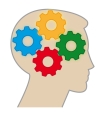 Alzheimer’s disease is “an irreversible, progressive brain disease that slowly destroys memory and thinking skills, and eventually even the ability to carry out the simplest tasks.” (National Institute on Aging – http://www.nia.nih.gov/alzheimers/publication/alzheimers-disease-fact-sheet.) It is a disease related to aging as the majority of people with Alzheimer’s start to experience its symptoms after age 60. There is a small percentage of people (less than 5% of Alzheimer’s patients) who suffer from an “early-onset” type and begin to see symptoms between age 30 and 60.
Alzheimer’s disease is “an irreversible, progressive brain disease that slowly destroys memory and thinking skills, and eventually even the ability to carry out the simplest tasks.” (National Institute on Aging – http://www.nia.nih.gov/alzheimers/publication/alzheimers-disease-fact-sheet.) It is a disease related to aging as the majority of people with Alzheimer’s start to experience its symptoms after age 60. There is a small percentage of people (less than 5% of Alzheimer’s patients) who suffer from an “early-onset” type and begin to see symptoms between age 30 and 60.
Researchers believe that Alzheimer’s disease results from a complex set of changes that occur in the brain over a long time due to genetic, environmental and lifestyle issues. At this point there is no cure. There are thousands of research projects on Alzheimer’s looking at it from various angles and in search of a cure. If you want to learn more about the disease and the research, please visit the following websites:
http://www.nia.nih.gov/alzheimers
Can You Help?
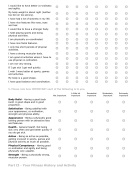 Whether you have a loved one with Alzheimer’s or just want to help in some way, please visit www.mindcrowd.org and participate in their online short term memory test that will help gather data to understand and treat brain disorders. If selected to participate further, you will be contacted to do more tests. Their goal is to enroll one million people in the study of the brain. The research is the vision of Dr. Matt Huentelman from Arizona State University and is being conducted as a collaborative effort among the leading scientific institutions and organizations concerned with Alzheimer’s. We have both taken the memory test and can say it was a challenge! Please tell everyone you know about this research and encourage them to participate.
Whether you have a loved one with Alzheimer’s or just want to help in some way, please visit www.mindcrowd.org and participate in their online short term memory test that will help gather data to understand and treat brain disorders. If selected to participate further, you will be contacted to do more tests. Their goal is to enroll one million people in the study of the brain. The research is the vision of Dr. Matt Huentelman from Arizona State University and is being conducted as a collaborative effort among the leading scientific institutions and organizations concerned with Alzheimer’s. We have both taken the memory test and can say it was a challenge! Please tell everyone you know about this research and encourage them to participate.
Living with Someone with Alzheimer’s
At the early stages of Alzheimer’s it might be funny to see your parent forget where they placed their keys or that they have 25 rolls of paper towel stashed in their basement and still buying more. However, as their Alzheimer’s progresses and they start to store their slippers in the fridge or use a wooden-handled frying pan in the oven instead of stove top, you begin to understand that life as an independent adult is over for them. It’s time for you to take over. What we often don’t realize is that it is going to get a lot worse! How can you help your loved one who has Alzheimer’s?
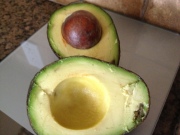 In working with clients who are experiencing symptoms of Alzheimer’s, Mary recommends a nutritional plan specific to nourishing the brain. Poor nutrition may play a role in the cause of Alzheimer’s and elderly people tend to have a poor diet whether it be for financial reasons or just because they don’t want to prepare meals. A nutritional program that would benefit someone with Alzheimer’s consists of foods rich in antioxidants, omega 3 fatty acids, the B vitamins, acetylcholine, high quality proteins, complex carbohydrates and clean water. As an example, here is a simple five day dietary plan that she has prepared for clients.
In working with clients who are experiencing symptoms of Alzheimer’s, Mary recommends a nutritional plan specific to nourishing the brain. Poor nutrition may play a role in the cause of Alzheimer’s and elderly people tend to have a poor diet whether it be for financial reasons or just because they don’t want to prepare meals. A nutritional program that would benefit someone with Alzheimer’s consists of foods rich in antioxidants, omega 3 fatty acids, the B vitamins, acetylcholine, high quality proteins, complex carbohydrates and clean water. As an example, here is a simple five day dietary plan that she has prepared for clients.
Reducing Your Chances?
Although there is no cure or ‘magic pill’ for Alzheimer’s at this point, researchers do know that it is a disease related to aging. The build up of plaque and tangles in one’s brain, shrinking in parts of the brain, inflammation and deterioration in functioning of neurons are all observed as issues with Alzheimer’s disease. How can we address this directly? That is one important issue that researchers are trying to answer. Whether the above changes are the cause or outcome of Alzheimer’s is not known. However, there are a few things that they recommend:
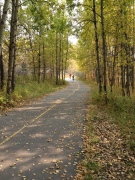 Physical Activity – Exercise is crucially important to aging well. Stay active so that you maintain both your physical and mental health. Physical activity helps with reducing inflammation, circulating blood and oxygen through your systems, maintaining healthy functioning of the heart, strengthening bones, reducing stress and “producing ‘happy’ biochemicals called endorphins…that drive away stress and depression and stimulate the immune system.” (Barron, Jon, Lessons from the Miracle Doctors, 2002, http://www.jonbarron.org).
Physical Activity – Exercise is crucially important to aging well. Stay active so that you maintain both your physical and mental health. Physical activity helps with reducing inflammation, circulating blood and oxygen through your systems, maintaining healthy functioning of the heart, strengthening bones, reducing stress and “producing ‘happy’ biochemicals called endorphins…that drive away stress and depression and stimulate the immune system.” (Barron, Jon, Lessons from the Miracle Doctors, 2002, http://www.jonbarron.org).
Sleep and Meditation – Achieving deep sleep is important for helping the brain to consolidate all that you have learned and moves your experiences from short term memory into long term memory. As we age, many of us have trouble sleeping and this can be problematic. According to Rudy, Tanzi, Ph.D., deep sleep, called Delta Waves, turns off the production of the main toxins that accumulate in the brain that cause Alzheimer’s disease. (http://youtu.be/0iqU4bBM5Rk). If we don’t get to deep sleep, we may be producing toxins that will harm our brain. He also suggests that people with sleep problems may benefit from meditation. Dr. Tanzi is a neurologist and researcher in brain neuroplasticity, specializing in Alzheimer’s, and suggests that we can rebuild neurons and their connections in the brain. He has published a book called Super Brain, which sounds quite interesting. We’ll let you know more about this when we get a chance to review it!
 Social Interaction and Stimulation – Maintaining a social network is important. Feeling connected, loved and cared about helps reduce depression. Depression is a common experience for people suffering from Alzheimer’s and having someone to interact with will help them stay engaged. Keep your brain stimulated by reading, participating in activities that require thinking like bridge, crossword puzzles and other games.
Social Interaction and Stimulation – Maintaining a social network is important. Feeling connected, loved and cared about helps reduce depression. Depression is a common experience for people suffering from Alzheimer’s and having someone to interact with will help them stay engaged. Keep your brain stimulated by reading, participating in activities that require thinking like bridge, crossword puzzles and other games.
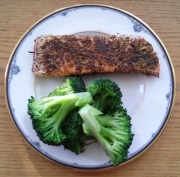 Nutrition – This is a very important component of staying healthy. A nutritional program that provides you with foods high in antioxidants, omega 3 fatty acids, the B vitamins, acetylcholine, high quality proteins, complex carbohydrates and clean water will help improve memory, concentration, mood and overall health. More specifically:
Nutrition – This is a very important component of staying healthy. A nutritional program that provides you with foods high in antioxidants, omega 3 fatty acids, the B vitamins, acetylcholine, high quality proteins, complex carbohydrates and clean water will help improve memory, concentration, mood and overall health. More specifically:
Eat Whole grains (complex carbohydrates)
- Quinoa, millet, steel cut oats – good sources of vitamin B1, B2, B3, B5, B6, folic acid, zinc, selenium, protein (quinoa has all the essential amino acids), fibre
- Must avoid grains that have been processed in anyway (such as white flour, whole wheat, rye) because they have lost most of their nutrients through processing – contribute to inflammation, mood swings, poor concentration and low energy
Eat Nuts and Seeds
- Almonds, walnuts, brazil nuts, hazelnuts – good sources of vitamin B1, B2, folic acid, vitamin E, selenium, zinc, protein, omega 3 fatty acid, fibre.
- Avoid peanuts that contain aflatoxins which is a potent carcinogen.
- Flax, hemp, sesame, sunflower, pumpkin – good sources of omega 3 fatty acids, vitamin E, zinc, B1, B3, B6, folic acid, protein, fibre
Choose Healthy Proteins
- Lentils, garbanzo beans, black, beans, split peas – good sources of protein, carbohydrates, fibre, vitamin A, beta carotene, vitamin B1, B2, B3, B5, B6, vitamin C, vitamin E, folic acid, zinc, selenium – other types of beans can also be added to the diet
- Chicken, steak, eggs – good sources of protein, vitamin A, vitamin E, B12, B1, B2, B5, B6, folic acid, selenium, zinc, acetylcholine
- Salmon, cod – good sources of protein, omega 3 fatty acids, selenium, zinc, vitamin C, vitamin A, vitamin E, vitamin B12, B3, B6, acetylcholine – other sources: sardines, trout, mackerel. Avoid sources that are not organically farmed. They will contain pesticides, antibiotics, hormones. These all contribute to toxins in the body and have less to no nutritional value
- Avoid proteins such as bacon, cold cuts, sausages that are high in nitrates (carcinogen) and contain no nutrients
Fruits and Vegetables
- Apples, strawberries, blueberries, kiwi, pears, pineapple, carrots, celery, cabbage, kale, green beans, broccoli, cauliflower, spinach, romaine lettuce, avocado – good sources of carbohydrates, vitamin A, beta carotene, vitamin C, vitamin E, folic acid, fibre, acetylcholine
- Avoid sources that are not organically farmed. They contain pesticides and other chemicals and are nutrient deficient
- Enjoy them as fresh as possible. When cooking maintain their nutritional value by lightly steaming (do not overcook as all the nutrients are lost)
Although there are no guarantees in life, we owe it to ourselves to do whatever we can to live well and stay healthy. At the end of the day, we can say that at least we tried to make a positive difference in our lives!
If you are dealing with a loved one suffering from Alzheimer’s, then you may appreciate the words from Shalane Flanagan (US Olympic marathon runner):
“Keep your head up, keep your heart strong.”
Shalane Flanagan
Note: We are not experts in this field. We have done research for our pesonal well being and are sharing what we have learned with you. Please always do your own research.

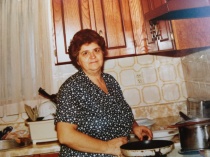
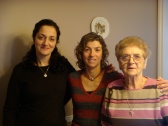
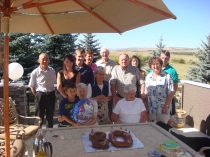
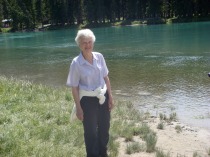
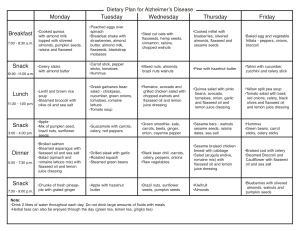













Way cool! Some very valid points! I appreciate you penning this
post and also the rest of the site is really good.
LikeLike